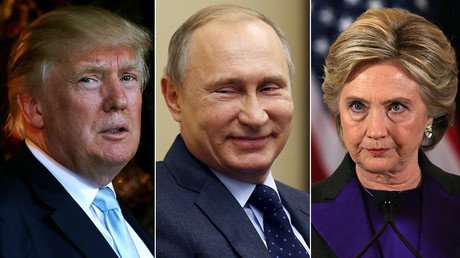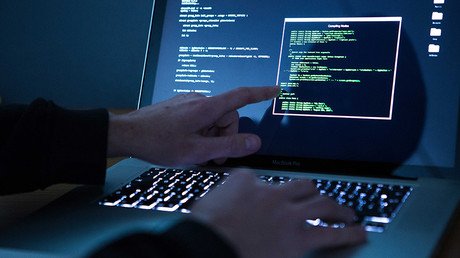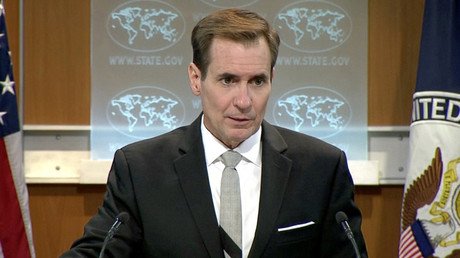‘Insider leaks, not Russian hacking’: CIA & MI5 veterans discuss ODNI report on RT
Former CIA chief James Woolsey, former CIA analyst Larry Johnson, and former MI5 officer Annie Machon spoke to RT about what the ODNI report on alleged Russian hacking reveals about the nature of their claims and the current state of the US intelligence.
In live debates hosted by RT on Monday night, Woolsey, Johnson, and Machon took turns providing their expert opinions on the Office of the Director of National Intelligence (ODNI) reported entitled “Assessing Russian Activities and Intentions in Recent US Elections,” which was released on January 6.
Missing evidence?
The unclassified ODNI report was expected to shed light on the scope of Russian involvement in the DNC leaks and provide evidence supporting the claims made by the US intelligence community. Instead, the report has proven to be quite a disappointment, with WikiLeaks editor Julian Assange slamming it as having “zero evidentiary weight.”
Former CIA agent Larry Johnson told RT that what had struck him about the report the most is that it contained “not one shred of evidence” to back up the sprawling accusations against the Russian government.
“At some point in that process, we should have seen either an electronic or human source that said Vladimir Putin or someone in his government had directed the cyber command in Russia to start a program or a plan… There is not one source of information in that report,” he said, arguing that such negligence in failing to provide a single source indicates that the so-called “hacks” were instead the result of internal leaks.
“The fact that WikiLeaks puts out emails, I think there is a plausible case to be made that they were in fact leaked to WikiLeaks,” Johnson pointed out, adding that “what we found out was not disinformation but actual truthful information.”
James Woolsey, who served as CIA director from 1993 to 1995, argues that omission of key evidence from the report is a normal practice in the US intelligence. Speaking about abrupt expulsion of dozens of Russian diplomats framed as “intelligence operatives” in December last year as part of the US response to Russia’s alleged interference in US elections on the side of Donald Trump, Woolsey said that “any time an intelligence officer is declared persona non-grata and excluded from the country, it is virtually never the case the evidence is shown.”
“Again, it’s a problem of disclosing sources and methods,” Woolsey argued.
Machon, who resigned from MI5 in 1996 and became a whistleblower, disagrees with the presumption of secrecy, saying that the report in its present form looks “intelligence-light.” The former MI5 agent believes that all this secrecy talk is a no more than a smokescreen to disguise the fact that the data was mostly collected “across the internet.”
“Of course, they are going to claim that they need to cut out the actual smoking gun, the evidence from this report. But actually, I don’t think anyone would be surprised at the depth of the penetration of the internet gathering of information,” she said.
Machon believes that if “indeed there had been hacking, there would be traces that could be found,” she said, citing estimates by William Binney, a former NSA intelligence official turned whistleblower.
“If… those traces have not been found, have not been reported, without any particular scientific methodology behind it – it does make the report very evidence-light,” she stressed.
Confidence discrepancies
Recent statements and reports released in connection with the alleged state-sponsored cyber activity of Moscow have been marked by conflicting assessments of confidence and actual disclaimers relieving certain agencies of responsibility for the accuracy of the information.
“You cannot have a consensus in the intelligence community unless there has been a document circulated within that community with which they are given a chance or either agree or disagree, dissent or modify,” Johnson argued, pointing to the lack of any such written document.
Instead, “we had a change of story” in the middle of the investigation, he said, with the perceived consensus on the issue among 17 agencies being boiled down to three, with a couple of equally important agencies such as the Defense Intelligence Agency missing.
“He [James Clapper] comes up and says there’s a consensus among the 17 intelligence agencies. This document reflects only the so-called consensus of NSA, CIA and FBI. The fact that the DIA is not even included, who is an expert on [Russian Main Intelligence Directorate] GRU, is stunning,” Johnson noted.
Woolsey argued that there is nothing unusual about different agencies not sharing the same perspective on events, adding that although there are 17 intelligence agencies in the US, most of them would not play any role in the discussions and assessments of the issue. At the same time, the fact that the agencies – the NSA on one side, and the CIA and FBI on the other – show “moderate” and “high confidence” in the report, constitutes a “small to moderate size discrepancy.”
Another detail that has cast doubt on the credibility of the report is Director of National Intelligence James Clapper himself, who was accused of perjury for lying under oath to the US Senate that the NSA did not collect any intelligence on millions of American citizens.
“This thing is so ridiculous, and the fact that you have these guys like John Brennan and Jim Clapper who both lied to Congress, and they lied under oath, is reprehensible. They should not be allowed to still be on the job,” Johnson argued.
While not denying that Russia has a cyber-warfare capability and intelligence organizations in the US – and vice versa – he said the facts in this particular case “simply don’t add up.”
If the FBI was convinced that the DNC leaks were a result from a hacking attack, then they would be treated as “criminal acts that took place in the United States.”
READ MORE: DNC docs were leaked, not hacked, intelligence veterans say
“So, at the minimum, the FBI should have been building a case and under than, it they had enough evidence, they can file a complaint and an indictment could be issued, indictment outstanding against Julian Assange and WikiLeaks for receiving stolen material, if in fact it was hacked,” Johnson said, stressing that the fact that this is not happening indicates a leak rather than a hack.
“The reality was, it was leaked, it was given to him [Assange].”
Parallels with Iraqi WMDs
Speaking to ABC’s George Stephanopoulos last week, outgoing US President Barack Obama confessed he had called on Donald Trump to listen to the intelligence community, even if their findings appear to be raw.
“When I talked to him about our intelligence agencies, what I’ve said to him is that there are going to be times where you’ve got raw intelligence that comes in and, in my experience over eight years, the intelligence community is pretty good about saying, ‘Look, we can’t say for certain what this means,’” Obama said.
There is a great deal of danger behind this attitude, argues Annie Machon, saying that a “flawed intelligence case” led the UK to war in Iraq.
“In the UK, for example, MI6 was feeding tidbits of raw and unassessed intelligence from unestablished sources directly into the reports that were presented to the UK parliament where the MPs voted to take us to this war. It’s very dangerous path to go down for intelligence agencies,” Machon warned, adding that publishing these types of reports in the first place implies “a certain degree of politicization going on behind the scenes of these reports.”
READ MORE: Assange blasts 'embarrassing' ODNI report, says 'no evidence' given
Asked whether the ODNI report should be considered a case of raw intelligence, Woolsey could not provide a clear answer.
“Well, I think it could be a mixture, the short answer is – I don’t know,” he said.
Johnson pointed out that the notorious assessment on Iraq’s WMDs and nuclear program did contain some factual evidence, but as Woolsey pointed out, the report was largely misleading.
“Just the fact that you can source evidence doesn’t make something right,” he said.















